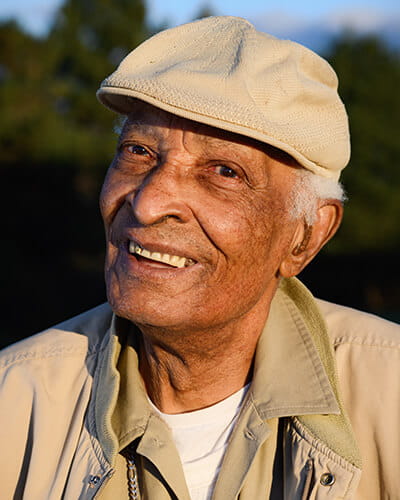The extraordinary educational journey and life of Dr. Joe Horton ’20, PhD in Public Policy and Administration, began in a farm field in rural Tennessee in the 1930s.As a child, Horton worked like his father, a sharecropper, and his grandfather, a slave, had always done, his hands deep in the red soil of the South. It was there that he first realized the impact racial injustice was likely to have on his future.
“I witnessed a bus full of white children going off to school while me and my siblings were working in the fields,” Horton recalls. “I never lost sight of that child. I didn’t understand why we were being denied an education.”

“Neither my grandfather nor my father could read or write,” he notes. “They never even knew if their pay was the correct amount after working the fields all week. I knew early on I needed to know how to read, how to write, and how to count my money.”
He’s done that, and much, much more.
Horton left the fields for good in 1948, joining a brother to relocate Flint, Michigan. With a week’s field pay of $7 in his pocket, Horton rode to Michigan on a mattress in the back of his brother’s pickup truck.
In many ways, Horton’s 70-year journey has paralleled the experience of many African Americans in the U.S. And although Horton has experienced racism and injustice on many fronts, he hasn’t stopped fighting to achieve the American dream.
Once in Michigan, Horton took odd jobs painting houses and delivering coal. Hoping for a better opportunity, he woke up early every morning to be the first in line at the gates of Flint’s auto plants. In 1949, he was hired by General Motors as a janitor.
It was a small step, but working as a janitor allowed Horton to see how the entire plant operated. He quickly realized that when it came to the way African Americans were treated, Michigan wasn’t so far from the fields. “I witnessed similar situations as the ones I saw in Tennessee,” he says. “The skilled trades were filled mostly by white men. I knew I couldn’t wait any longer to get going on my education.”
A Lifelong Quest to Learn
Horton took correspondence courses for radio and television repair, spending 20 years working to earn his journeyman’s card, in hopes of becoming an electrician. During that same time, he earned his high school diploma. Horton eventually became a welder at General Motors and earned a reputation for being the best of his trade at the plant.
Over the next 60 years, Horton’s life would be influenced by two consistent themes: being handicapped by systemic racism and refusing to be defeated by it. He stayed with General Motors for many years, pausing only to serve in the Korean War. After retiring, Horton decided to pursue higher education. At age 77, the sharecropper’s son received his bachelor’s from the University of Michigan. At 80, he earned his master’s.
Then it was time to take the next—and final—step.
Achieving His Dreams at Walden
Horton enrolled at Walden University in 2010; he chose Walden, he notes, because “it had all I wanted in a school.” The university offered his desired curriculum, flexible online learning, and access to student support services.
“Pursuing my PhD was the final educational itch in my soul that had started in the fields of Tennessee,” he says. It took him 10 years to finish his doctoral work, a decade that proved as challenging as the many others he’d faced. The work was difficult, and in the midst of his studies, in 2015, he lost his beloved Dolores.
“I nearly dropped out,” he notes, “but failure has never been an option.”
In 2020, Horton was awarded his PhD. His dissertation focused on the policies governing older adults’ access to home- and community-based services.
“Getting a PhD was the hardest thing I’ve ever done,” he explains, “but not as hard as withstanding the racism I’ve faced and not as hard as knowing my wife is not with me to complete this journey.”
“Racism was a driving force for me to get educated, no matter what else was going on,” he continues. “I was a slave to the sharecropping industry, picking cotton and planting corn. I was a victim during my years at General Motors. In the Army, I experienced more hardships. But I believe in the Creator, and that helped me redirect myself from thoughts of hatred. I’m peaceful knowing I was not like those who have been so cruel to me and others like me.”
As for his doctoral work, he’s proud his journey has been an inspiration for others.
“Many of my family members have completed college, and others continue to this day to get an education because of my determination at my age,” he says.
The fight for racial justice, he added, has made some strides in his lifetime, but there’s more work to be done. But in the end, that boy in the field who watched the wheels of education turn only for others has made significant strides to help himself and others to bloom—and to leave the fields behind.



